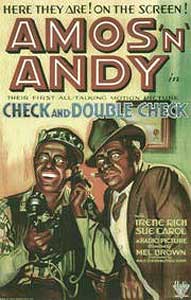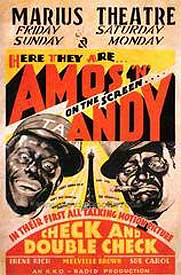 Freeman F. Gosden & Charles J. Correll are white guys playing black guys Amos & Andy, in blackface, in Check & Double Check (1930). If it were even possible to overlook the blackface performances full of horrible stereotyping, it would still be hard to find anything funny in this alleged comedy.
Freeman F. Gosden & Charles J. Correll are white guys playing black guys Amos & Andy, in blackface, in Check & Double Check (1930). If it were even possible to overlook the blackface performances full of horrible stereotyping, it would still be hard to find anything funny in this alleged comedy.
Our two heroes experience an "old dark house" scenario as they involve themselves in service to a white friend who comes off just a little like the beloved plantation master. The story is never fully engaging & the most that can be said in its favor is neither Amos nor Andy are ever bad people, & they do strive heroically.
Trying hard to find praise for what Gosden & Correll were attempting, it must be admitted that even black actors in similar "Old Dark House" scenes run away with eyes rolling. But here our heroes face & overcome their fears & serve their white master, err, friend, to a successful conclusion.
The caricatures they create in blackface are thus not worse than black comedians, in order to be employed in Hollywoood, would agree to act out, though frankly, if I had to see a "feets don't fail me now" coward played by Willie Best or Mantan Moreland, or more blackface performances trying twinking with that pattern, give me Mantan & Willie, please.
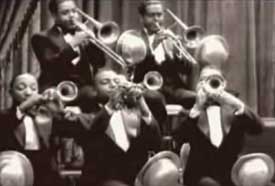 For it remains that the only real moment of light in Check & Double Check is the interlude with the Duke Ellington orchestra. And for this footage we have to be very, very happy the film exists, lending it an ingredient far away from the sentimental racism the film represents as artifact of an era. For it remains that the only real moment of light in Check & Double Check is the interlude with the Duke Ellington orchestra. And for this footage we have to be very, very happy the film exists, lending it an ingredient far away from the sentimental racism the film represents as artifact of an era.
Gosden & Correll played these characters on the radio for decades & were incredibly popular, the gods alone know why. And for better or worse, the radio show was much funnier than the dreary movie it inspired. Even filmgoers who had no sensitivity to insult disliked the film in its day, though more for making the well-known characters people came to see subsidiary to the romantic lives of the white people in the just awfully lame story.
It is certainly not a modern development that they are thought of as offensive, as they came under considerable fire from black intellectuals even at the height of their success. Their excuse was always "some of my best friends are" & they grew up in the southwest near black folks who spoke & behaved identical to Amos & Andy.
When the series moved to television in the 1950s, an actual African American cast took over, & the show was suddenly pretty damned funny. The television series had first-rate scripts & actors who gave depth to even the silliest stereotypes, & the full array of characters was by no means restricted to the silly.
It was the first black-cast sitcom & would for too long remain the only one to feature dignified black doctors, lawyers, business owners, professionals of all kinds. There was a recurring janitor character named Lightning, played by Horace Stewart (who also created the dance & comedy character of Nicodemas), & he was the most deplored.
Some said Lightnin' was patterned on Stepin Fetchit making him the main offensive character on the show, though Stewart took the role thinking he could keep it from being stereotypical, & knowing he could use the money to keep his black theater company alive, giving actors opportunities to play something other than maids or shoeshine boys.
The television program represented a black middleclass in a time of segregation as amusing but good people, bringing nuance & depth to figures that on the radio, when played by white folks, could not transcend stereotype. The only other black folks on television were in the news invariably giving the impression that poverty & violence was the one & only experience if you were black in America.
Yet black leaders harrassed CBS until they cancelled the show after only two seasons, then continued the harrassment for more than a decade until the series was withdrawn from rerun syndication, so that good work by black entertainers for all intent simply vanished in 1966.
And knowing thereafter that the black organizations would harrass any show that was not so role-model-perfect that only a complete moron would want to watch it, it didn't go easy getting black characters back on situation comedy for quite some while thereafter.
We might question how it was that condemnation from the black community could not get rid of the white-dominated radio program in decades of trying, but when it represented work for black artists, the criticisms were too much to bare & activists successfully deep-sixed the careers of a number of African American performers.
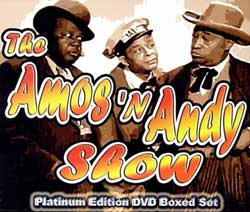 What if other early sitcoms had been black cast? If Ozzie & Harriet had been a black cast, it would have been faulted for a shiftless father who never once went to work. What if other early sitcoms had been black cast? If Ozzie & Harriet had been a black cast, it would have been faulted for a shiftless father who never once went to work.
If the Spring Byington Show was black cast, the star would've been dismissed as a mammy stereotype. If Life of Riley had been black cast, Riley would've just been another dundering clown like Andy. If Bachelor Father had been black cast it would've been faulted for portraying a non-traditional hence broken family.
If The Honeymooners had been black, gotta fault it for showing black men as clownish verbally abusive scheming failures. If The Real McCoys were black cast, they'd be the worst cliche of southern rural darkies. And if given exactly what the politicos seemed to demand, a black version of The Donna Reed Show or Leave it to Beaver, it would be faulted, as The Cosby Show would one day be faulted, for it's upper-middleclass assumptions & failure to represent the actual economic distress of the community -- requiring something closer to Amos 'n' Andy perhaps.
In consequence of all the high dudgeon against the Amos 'n' Andy televison show, some of the cast members never worked again. Alvin Childress as Amos just decided to give up since he was demeaned even by his own race for doing his best to invest an established well-known character with humanity. Some of the actresses thereafter got to play maids now & then, & some of the guys would turn up in minor or even uncredited roles as janitors or cooks.
Black doctors & judges & business owners would not be seen in quite a long while, & when Sanford & Son finally assumed black business ownership was feasible, it required its star to live in a garbage dump.
But by then intellectuals & politicos had figured out it hurts the community itself to demean its own artists & destroy their careers. Which is not to say criticism went out the window, but the murderous venom that savaged the community itself was tempered.
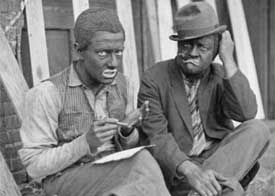 Those actors deserved credit & honors for presenting, even in a comedy context, surprisingly positive images of an African American neighborhood of families & professionals. Those actors deserved credit & honors for presenting, even in a comedy context, surprisingly positive images of an African American neighborhood of families & professionals.
But Amos 'n' Andy had been done in insulting blackface for too long & the black community didn't like these guys, period. As the civil rights movement gained momentum, several fine comic actors & actresses were shunted to the side of the road, demeaned & deplored, most of them very surprised & saddened by it.
In the last decade or so, the series has been reassessed & discovered by many not to have deserved the assaults it suffered, & certainly the actors should never have been banished & condemned. It's too bad most of them were dead before anyone could apologize for categorizing them as a big pack of disgusting enemy Toms.
It was an injustice of aggressive overreaction, an injustice to decent black character actors. Yet we must consider the nightmarish assault on African American dignity in the blackface performances of Check & Double Check.
In understanding exactly what was the nature of the original version of what white America eagerly & faddishly embraced as representative of black people, we might find some understanding of how meritorious performers from early television could not be appreciated when the foundation of their roles was radio & cinema's worst conceivable stereotyping of African American men as ignorant & childlike & void of nuance.
copyright © by Paghat the Ratgirl
|
